Two family dramas are playing out around a notorious Bay Area homicide. A killer’s sister is trying to get him out of prison early and the victim’s mother is outraged. Primarily because the sister asking for mercy is the mayor of San Francisco. Investigative Reporter Jaxon Van Derbeken has the story you’ll only see on NBC Bay Area.
San Francisco Mayor London Breed has written a letter asking for outgoing Gov. Jerry Brown’s help to free her brother, who is not eligible for parole for another 15 years in a notorious homicide case.
Back in 2000, he pushed a young mother out of a car and into Golden Gate Bridge traffic. Napoleon Brown, 46, is now serving a 44-year term in Solano State Prison for manslaughter, robbery and other crimes tied to the death of Lenties White.
Both White’s family and legal experts question Breed’s letter, which was obtained by NBC Bay Area’s Investigative Unit.
Breed wrote to the governor as part of an official application in October that while she did not think the four-decade sentence against her brother was fair, “I make no excuses for him. His decisions, his actions led him to the place he finds himself now.”
She says her brother has been through addiction, parenting and other programs in state prison. Outside, she assured, he would have “strong” family support.
“I guarantee we can secure him access to a job, to a good home, to the counselling and services he and every other addict need for the rest of their lives.”
His freedom, she says, is “what’s best for both Napoleon and society overall.”
Local
But Sandra McNeil, the mother of the 25-year-old victim, disagrees.
“I don’t think it would be justice,” she said. “She’s the mayor, so she’s got a little power, so she thinks she can get her brother out.’’
Veteran prosecutor turned defense attorney, Chuck Smith, said the mayor’s letter raises all sorts of ethical questions.
“The timing of it is troublesome,” Smith said. “She could have written this letter six months ago, when she wasn’t mayor -- and she didn’t. The governor obviously is leaving office soon.”
In writing the governor, Breed left out that just last year, according to court records, her brother was caught with heroin in prison. As a result, he had another two years tacked onto the sentence he was already serving for manslaughter, robbery and other crimes.
Brown had a prior robbery on his record when he was originally convicted of murder and robbery and sentenced to 44 years in prison back in 2005. While the murder verdict was overturned by a judge for technical reasons, Brown ultimately agreed to plead to involuntary manslaughter. He was eventually resentenced to 42 years.
The extra time for the drug offense brings his term back to 44 years. He is eligible for parole in 2032.
McNeil says another thing Breed left out in that letter was that Breed herself tried to provide her brother with an alibi, testifying in the trial that Napoleon Brown was sleeping on their couch at midnight. That was when prosecutors said Brown robbed a Marina District restaurant and later pushed White from the getaway vehicle.
The jury heard evidence that White’s dying words implicated Napoleon Brown as her killer.
The governor’s office declined to comment, citing a policy of not discussing such pending requests.
Breed issued a statement, stressing that she was joining in her family’s request to reduce her brother’s term, given that he has already served nearly 20 years.
“I do believe that people need to face consequences when they have broken the law, but I also believe that we should allow for the rehabilitation and re-entry of people into society after they have served an amount of time that reflects the crimes committed,” she said in a statement issued Tuesday.
“Too many people, particularly young black men like my brother was when he was convicted, are not given an opportunity to become contributing members of society after they have served time in prison. I believe my brother deserves that opportunity.”
“I am not asking for my brother to be pardoned or for his conviction to be wiped away, but simply for the Governor to consider initiating the commutation of his sentence. This would only be the first step in a long process that involves a thorough investigation by the Parole Board and a decision by the California Supreme Court.”
“My family and our community is ready and willing to help support my brother, and we will take this responsibility seriously if his sentence is commuted. I believe he will better serve society, the community, his family, and his children outside of prison. Ultimately this determination is up to the Governor and the courts, but I join my family in making this request.”
But attorney Smith said he is troubled by the fact that the letter leaves out key information, like the heroin possession and Breed’s role as an alibi witness.
“If there are negative facts,’’ he said, “it is the obligation of the office holder to bring forth those negative facts and address them. Rather than just try to sweep them under the rug…. It smacks of ethics which are not exactly up to par in my opinion.”
McNeil said the clemency effort, and the mayor’s letter, is reopening old wounds.
“I thought it was done and over,” she said, “Justice was served and that was the end of it -- I never knew there was going to be another beginning of it.”



